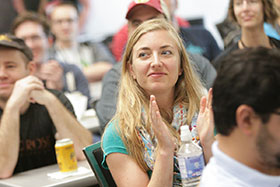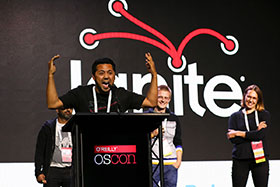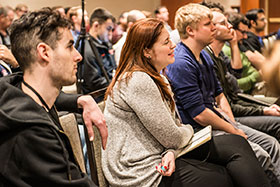Ignite Strata San Jose

Ignite is back at Strata on Tuesday, March 6. The theme emphasizes the wonder and mysteries of big data and pervasive computing. Join us for a fun, high-energy evening of speed talks—all aspiring to live up to the Ignite motto: Enlighten us, but make it quick.
Ignite is free and open to the public. Strata attendees do not need to register; your conference badge grants you entry into this event.



General schedule:
- Reception: 6:30pm–7:00pm
- Presentations: 7:00pm–8:00pm
Presentation schedule
Abdicating transportation
Alistair Croll (Solve for Interesting)
A Bayesian consumer choice model for home video entertainment
Violeta Hennessey (Warner Bros.)
Consumer spending on home video entertainment has remained flat for the past five years. Consumers are merely shifting their spending through different channels, such as Netflix streaming. Violeta shares why industry studios may want to consider a proactive approach to regain consumer spending market share.
How to confuse, bore, and frustrate your presentation audience
Paige Roberts (Syncsort)
Many classes and talks exist on how to create excellent presentations, yet terrible presentations still happen. The secret is that classes on how to do terrible presentations also exist. As one of the hidden presentation-destroying Illuminati (aka a professional marketer), Paige clues you in on the secret methods that only genuinely abominable presenters use to bore, confuse, and frustrate an audience.
Introducing the #DataResponsibility Initiative
Val Bercovici (PencilDATA)
Val offers an overview of the #DataResponsibility Initiative. In the era of device addiction, an attention economy, and surveillance capitalism, this initiative will enable new levels of organizational data transparency and user data control with the formation of a metacommunity focused on existing and new open source projects throughout a modern data pipeline (streaming, queuing, transformation, integration, database, analytics, postprocessing, storage, networking).
Learning to be a “searcher” in a “planner” world
Scotty Huhn (Crisis Text Line)
The data team at Crisis Text Line considers themselves searchers. Scotty discusses the differences between searchers and planners: planners visualize a goal and work backward to devise each step forward, while searchers focus on directed experimentation, investing resources in tests that prove most successful. Sporadic (or complete) failure is inevitable; progress and discovery is possible, if just the right combination of factors comes together.
Multitasking: Function or fiction
Reed Rawlings (City Year San Jose)
As technology demands more of our attention the default is to multitask. But, research shows that multitasking is an ineffective misnomer. This Ignite talk will challenge the belief that multitaskers can do it all by exploring its effects on cognition.
Why don’t you understand what I’m saying?
Cristian Olarasu (Lore IO)
Cristian Olarasu explores the shifting nature of data definitions and how it impacts our day-to-day communication in the office. Along the way, Christian explains how these definitions evolve and change to meet new and shifting agendas and how organization stakeholders can use automation to maintain a single source of truth of their business data.
Building pipelines for streaming data into visualizations: A fun example using Minecraft
Angel Alvarado (One Degree)
Angel demonstrates how to use StreamSets, Apache Kafka, Docker, and GeoLite to stream data into interactive visualizations and walks you through an example of how to set up a pipeline to stream data into Minecraft mapping users from around the world in real time.
Explorer graph algorithms for data science with Neo4j
Ray Bernard (SuprFanz)
Ray offers a very quick overview of graph theory and the graph algorithms available in Neo4j.
A/B testing for organs
George Weiner (Power Poetry)
Getting a user to hand over their credit card info online is nothing compared to handing over their organs. Organ donation in the US is not mandatory, and at present 52% of eligible American’s are registered, though 93% say they would accept an organ. George shares a case study of a collaboration with the largest organ donation network to use A/B testing to increase organ donation.
Sponsorship Opportunities
For exhibition and sponsorship opportunities, email strataconf@oreilly.com
Partner Opportunities
For information on trade opportunities with O'Reilly conferences, email partners@oreilly.com
Contact Us
View a complete list of Strata Data Conference contacts
©2018, O'Reilly Media, Inc. • (800) 889-8969 or (707) 827-7019 • Monday-Friday 7:30am-5pm PT • All trademarks and registered trademarks appearing on oreilly.com are the property of their respective owners. • confreg@oreilly.com





















